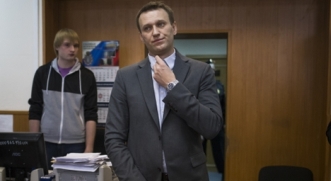What does Navalny get from running for presidency?

Russian opposition leader Alexey Navalny speaks to a journalist during an interview in the Echo Moskvy (Echo of Moscow) radio station on April 8. Source: AP
Opposition leader Alexei Navalny's plans to stand for Russia's presidency fueled debate about the future of Russia's liberal movement. Political pundits believe that this stance will be able to raise the profile of liberal protest movement while others put his chances into question.
Navalny announced his intentions to run for Russia's presidency during a recent interview with the Dozhd (Rain) tv channel.
“I want to be President. I want to change life in our country; I want to change the way the country is run,” Navalny told his interviewer.
Navalny didn't go into any detail about his platform.
“I’m not going to lie, cheat or steal, so what else do you need?” he said.
Navalny, who was educated as a lawyer, shot to fame as the instigator of a number of Internet projects aimed at fighting corruption. He has been actively involved with opposition movements since 2011 and played a large role in the organization of the mass protests that took place in Russia following the country’s parliamentary and presidential elections in 2011-2012.
According to a study conducted in late March by the Levada Center involving 1,601 people from 130 towns and cities in 45 regions, 37 percent of those polled knew or had heard of Navalny. However, only one percent of the respondents said they would vote for him in a presidential election, while 38 percent were opposed to his candidacy.
“If a candidate possesses the necessary resources – and it is vitally important to have the informational, financial and administrative resources, as well as a good campaign team and an electoral base – and genuinely plans on winning, then he needs to have everything: charisma and a practical platform at the very least," political figure and former presidential candidate Irina Khakhamada said commenting on Navalny's chances.
"Navalny doesn’t have any resources whatsoever," she added. “That’s why I reckon he’s got something else in mind. When I ran for president, for example, I wasn’t interested in winning, per se. I wanted to raise the profile of liberal protest.”
"If that’s what Navalny is after, then he’s sure to get it. He succeeds where others have failed not only because he is charismatic, but also because he gets tangible results when he exposes some Duma official or other; he’s been able to get deputies removed from office. These are concrete achievements in the war against corruption. And he’s got charisma. That’s why his program isn’t so important. For the purposes of consolidating his electorate, it’s enough in this case to have a goal, charisma,” said Khakamada.
Khakamada believes that while Russians may be unhappy with certain things in the country and in the political establishment, few of these voters are ready to demonstrate their dissatisfaction at the polls.
“As soon as the president himself appears, the majority of people become very conservative,” she said.
Members of various political parties also rate Navalny’s chances of winning a general election as very low.
“He can count on the right-wing liberal niche, so about 5–7 percent of the vote, tops,” State Duma Deputy and member of the Communist Party Sergei Obukhov said in an interview with RIA Novosti.
Vladimir Ovsyannikov, a Duma deputy from the Liberal-Democratic Party of Russia (LDPR) believes that Navalny’s rating currently hovers around 10–13 percent in those circles, “where there is a leaning towards pro-West, liberal democracy.” Yet “miners, metalworkers, grain farmers and agricultural workers – that is, the majority of the population – are basically indifferent towards him,” Ovsyannikov said, according to RIA Novosti.
Navalny could face one additional problem. He has been charged with embezzlement and fraud and his trial is set to begin in mid-April. Navalny and his brother have also been charged with stealing 55 million rubles ($1.8 million) from foreign cosmetics company Yves Rocher Vostok.
If found guilty, he faces a sentence of up to 10 years.
Navalny for his part has denied all charges, countering that criminal charges have been filed against him in order to prevent him from being able to take part in the presidential elections. The Duma is currently considering a bill that will forbid anyone convicted of a serious crime from running for State Duma.
“Having made his political plans public, Navalny is showing that he has no intention of backing down,” said political analyst Yuri Krugunyuk. “He’s planning to come out of this particular battle with some political kudos.”
Russia's next presidential elections are scheduled for 2018.
All rights reserved by Rossiyskaya Gazeta.
Subscribe
to our newsletter!
Get the week's best stories straight to your inbox
